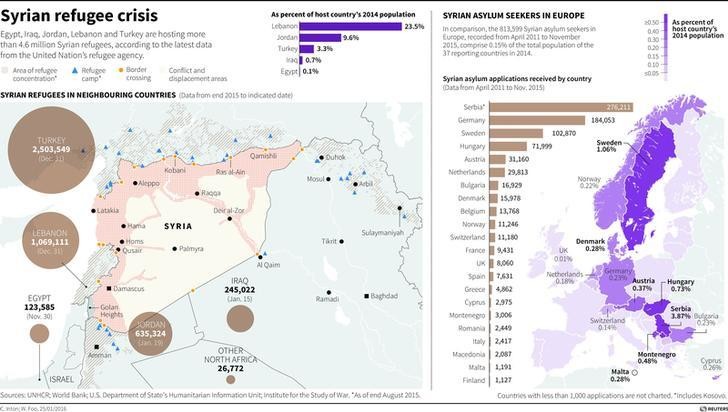Europe’s geopolitical wake-up call
来源:本站原创;发表于:2016-02-18;人气指数:395
Europe’s geopolitical wake-up call
Image: REUTERS/Tony Gentile
Written by
Carl BildtPrime Minister of Sweden (1991-1994) and Minister of Foreign Affairs of Sweden (2006-2014), European Council on Foreign Relations (ECFR)
Published
Thursday 18 February 2016
It was only in 2003 that the EU opened its first ever Security Strategy meeting with the statement that: "Europe has never been so prosperous, so secure nor so free. The violence of the first half of the 20th Century has given way to a period of peace and stability unprecedented in European history."
But as the EU now tries to flesh out a new European Global Strategy, it faces a world more complex, more connected and more contested. Or, to be blunt, distinctly more dangerous.
That the overall global picture has become more complicated is hardly disputed: Henry Kissinger talks about the most complex situation since World War II.
It is in Europe’s backyard, however, that the security situation has deteriorated particularly dramatically. The war between Russia and Georgia was a warning, turmoil in the Middle East spread in the backlash against the so-called Arab Spring of 2011, and the Russian wars against Ukraine in 2014 and 2015 marked further lows.
Unfortunately, there is no end in sight.
Many European business leaders have been slow to integrate heightened political risk into their planning processes, partly because the usual warning signs of political instability – commodity prices and bond spreads – are not flashing red, as a result of the shale oil boom in the US and quantitative easing in Western economies. Political leaders, meanwhile, have been so busy with multiple domestic and European crises that they have often lacked the attention and resources for a more far-sighted and forceful foreign policy.
Today, a revisionist Russia in the East and a multifaceted meltdown of large parts of the Middle East in the South presents Europe with foreign and security policy challenges of almost unprecedented complexity. Much of the EU’s credibility and weight in the future will depend on how it handles its immediate external challenges.
Russia: A combination of military strength and internal fragility could make Russia even more unpredictable in the years ahead. President Putin, who looks set to stay in power beyond 2017, might halt and consolidate his position in Eastern Ukraine, hoping that the West’s half-hearted engagement will later present new opportunities for expanding Russian influence in the future.
But the larger risk is that, as the domestic social and economic situation becomes more difficult, the Kremlin in the coming years will be tempted into further political and military adventurism. With a weaker economy, and a stronger military, the risks are obvious. A fragmented Europe will add to the risks.
Middle East: Current negotiation efforts notwithstanding, an early resolution of the conflicts in the Levant looks extremely unlikely. Even a diplomatic deal between the US, Russia, Iran and other major powers would not necessarily bring peace between the fighting factions on the ground. Nor would it help to restore the economic and social fabric of the region, which has been largely destroyed. A recovery will take decades. Therefore, Europe must be prepared for the continued pressures of migration from these and also more far-flung regions, where people are losing hope for a better future. The ongoing conflicts in the Middle East may also translate into heightened terrorism risk in EU countries for years to come.

Turkey: The EU’s relationship with Turkey – a key strategic actor in the region and already home to well over two million refugees – will become even more important. In late 2015, the EU revived Turkey’s largely frozen accession talks, while Ankara promised to cooperate in managing refugee flows. A settlement of the long-running conflict in Cyprus – which looks possible in 2016 – would add further momentum to the EU-Turkey talks although domestic developments in the country will continue to complicate the situation.
The United States: The US will be chiefly focused on its presidential election in 2016, which might limit its attention to international issues. For the EU, this could be troublesome, since US leadership is regularly the precondition for any international initiative. In January 2017, a newly elected president will move into the White House. He or she will probably reach out to the Europeans, offering co-leadership and demanding that they share more international responsibilities, in particular in their own neighbourhood. The EU must not miss this opportunity.
The EU has not managed to build a strong and coherent common foreign and security policy. On the contrary: we have seen a tendency towards renationalisation. On many issues Berlin seems more important than Brussels. But a new European Global Strategy in June 2016 might possibly signal a new start.
NATO, meanwhile, faces its own challenges. The NATO summit in July 2016 will have to grapple with demands primarily from the alliance’s Central and Eastern European members for a stronger deterrence posture. Although most NATO countries have stopped slashing their military budgets, most are still far off the agreed target of spending 2% of their GDP on defence.
This essay is drawn from the Global Agenda Council on Europe's report, Europe: What to watch out for in 2016-2017.